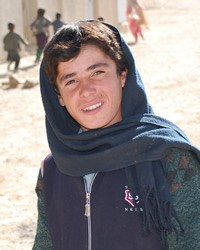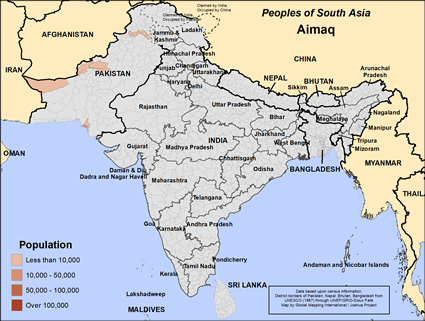Aimaq is a generic term for "tribal people," and their roots probably trace back to Mongol invaders in the 1200s. Once nomadic peoples, the 20 or so Aimaq peoples were forced by cycles of severe drought and war into semi-nomadic lives, traveling seasonally to graze decimated herds and/or subsisting as sedentary farmers and carpet weavers in mud-brick villages. Though the Aimaq peoples have their own languages, few seem to speak it anymore. Most speak the trade language of the country where they live. Most are in either Afghanistan or Iran, but there are smaller Aimaq populations in Turkmenistan, Tajikistan and Pakistan.
Food and dress are likely similar to nearby people groups. The staple food, eaten at every meal, is thick, whole wheat bread baked in mud ovens. Rice, chickpeas, potatoes, and summer garden vegetables accompany chicken, eggs or lamb (for guests or celebrations). Dugh, a beverage made with yogurt, salt, pepper and water, is also part of their diet. Women enhance drab lives by wearing brightly colored clothes sewn with glittering sequins over white or colored tumbons (pants). Outside their homes, women modestly wear the chadder namoz, a dark head-to-toe covering, and many still don a burka when in Herat. Men are seen in turbans or round caps with rough-textured cloaks draped around their shoulders. Based on clan and extended family, the Aimaq are led by men and trace ancestors through male lines. Even so, Aimaq women exercise unusual privileges compared to other rural Afghan people groups in that they meet with the men and freely voice opinions, even with strangers present. Marriage is the most important life event celebrated among the Aimaq and is celebrated with much dancing to rhythms beaten on flat drums. By tradition, a union is arranged in early childhood. Marriage takes place when a girl is 13 or 14, usually to a blood relative slightly older, 16-20, or as a second wife to a much older man in his 40s. Uniquely among the Taimani and Firozhoki, girls marry at age 18 and may reject a father's choice of husband. Traditionally, a bride moves immediately into the home of her husband's family following the wedding rites. There are unusual instances, however, of a groom moving into his future in-law's compound for two or more years of service before the marriage ceremony is performed. Aimaq tribal customs remain stronger than any form of nationalism, due in part to long-enjoyed independence and geographical distance from central governments. Tribal law vested in village leaders usually prevails over government authority and even some Islamic rules.
Though they are Sunni Muslims, the Aimaq peoples include pre-Islamic beliefs that would put them in the folk Islamic category. They depend on Allah for eternal salvation, but the spirit world for their daily needs. Almost none of them depend on Jesus Christ, the Risen Savior.
The Aimaq peoples need abundant rain so their livestock and their crops can flourish.
Pray for abundant rain in the Aimaq homelands so their crops and livestock can thrive. Pray for workers to go to the Aimaq peoples in Pakistan. Pray for a spiritual hunger that will allow Aimaq people to accept the lovingkindness of Christ. Pray for a Disciple Making Movement among each Aimaq people this decade.
Scripture Prayers for the Aimaq in Pakistan.
| Profile Source: Joshua Project |











